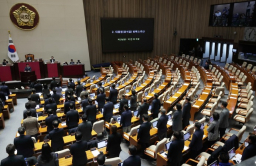-
KOSPI 2577.27 -2.21 -0.09%
-
KOSDAQ 722.52 -7.07 -0.97%
-
KOSPI200 341.49 +0.02 +0.01%
-
USD/KRW 1396 -2.00 0.14%
Korea’s commercial vehicle sales tumble on economic slowdown
Automobiles
Korea’s commercial vehicle sales tumble on economic slowdown
Sluggish economy, political turmoil are expected to prevent a recovery in the domestic commercial vehicle market
By
Dec 12, 2024 (Gmt+09:00)
2
Min read
News+

South Korea’s commercial vehicle sales are plunging on sluggish domestic demand amid a slowdown in Asia’s fourth-largest economy.
Local sales of new commercial vehicles, mostly small trucks, fell 19.2% to 178,700 units in the first 11 months of 2024 from a year earlier, according to Seoul-based automotive data provider CarIsYou on Wednesday.
The sales are likely to fall below 200,000 units this year, for the first time since the information provider started compiling such data in 2012 as the country’s deepening political turmoil following the declaration of martial law on Dec. 3 could pose further downside risks to the domestic economy, industry sources said.
“Domestic commercial vehicle sales are likely to only be about 190,000 units this year if sales in December remain around average levels,” said a CarIsYou official.
New commercial vehicle sales in the country stood at 238,205 units in 2023, up from 228,275 units in 2022 and 225,685 units in 2021.
Declining sales accelerated in the second half of this year with a 26.3% drop in October and a 16.6% fall in November.
SLUGGISH ECONOMY, POLITICAL TURMOIL
“Commercial vehicle sales are unlikely to rebound for the time being as the crisis among the self-employed intensifies due to the economic slowdown and a potential impeachment of the president,” said a commercial vehicle dealer.
The National Assembly is widely expected to vote a second time this weekend on the impeachment of President Yoon Seok Yeol, who vowed on Thursday to “fight until the end” the attempts to remove him from office after his short-lived imposition of martial law.
Yoon survived the first impeachment vote against him on Dec. 7 after apologizing to the public for causing “discomfort and anxiety” with his martial law declaration.
Used commercial vehicle sales have also decreased in recent months. The sales of second-hand trucks, vans, buses and others began declining in August and fell 23.7% in October from a year earlier. The sales rose by more than 10% in July.
Sales of used commercial vehicles, which totaled 330,229 units in January-November, are likely to be around 350,000 units for the year, compared to over 400,000 units in 2020.
“Sluggish earnings at core industries such as petrochemicals, steel and electronics boosted concerns over an economic downturn,” said a commercial vehicle dealer. “Lower sales of small trucks, usually bought by self-employed and small business operators, indicates significant deterioration in economic sentiment.”
Write to Jae-Fu Kim at hu@hankyung.com
Jongwoo Cheon edited this article.
More To Read
-
 Business & PoliticsS.Korea's Yoon survives impeachment; economic fundamentals firm
Business & PoliticsS.Korea's Yoon survives impeachment; economic fundamentals firmDec 07, 2024 (Gmt+09:00)
-
 Business & PoliticsSouth Korea’s president apologizes for martial law
Business & PoliticsSouth Korea’s president apologizes for martial lawDec 07, 2024 (Gmt+09:00)
-
 Business & PoliticsSouth Korea president to lift martial law after Parliament rejects move
Business & PoliticsSouth Korea president to lift martial law after Parliament rejects moveDec 04, 2024 (Gmt+09:00)
-
Nov 28, 2024 (Gmt+09:00)
-
Nov 12, 2024 (Gmt+09:00)




